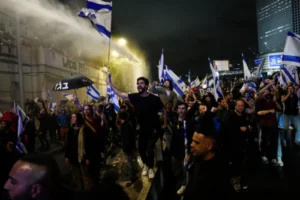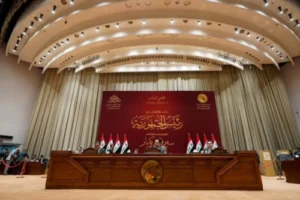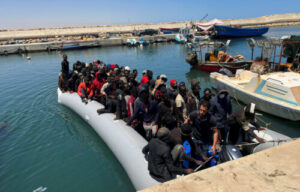
The National Interest Foundation Newsletter
Issue 185, March 31, 2023
Welcome to our NIF Newsletter. In this week’s headlines: we examine the ongoing protests in Israel and the implications for the Palestinian people, look into the recent electoral change in Iraq, and investigate claims by the United Nations that the European Union backing Libyan forces implicated in human rights violations.
Written by Breje Khan-Williams; Edited by Jacob Van Veldhuizen
Israeli Protests Continue

Israeli protests intensified after the dismissal of Israeli Defense Minister Yoav Gallant. (Photo from AP)
As Israel Protests, Netanyahu Stalls
The recent protests and strikes that have swept across Israel in opposition to a contentious judicial overhaul have sparked concern from the international community, including the United States and Germany. The massive protests throughout the country were triggered by Prime Minister Benjamin Netanyahu’s dismissal of Defense Minister Yoav Gallant, who had warned that Netanyahu’s pursuit of judicial reform would harm national security. With universities, airports, and big businesses joining in the nationwide strikes, the message from the Israeli people is clear: they believe that the proposed judicial changes are undermining democracy.
The current judicial crisis in Israel shares some similarities with Poland’s experience between 2016 and 2018 when a judicial overhaul put the independence of the courts at risk of political control. The proposed legislation in Israel would give the Knesset the power to reject Supreme Court decisions with a small majority vote and remove the Supreme Court’s control over government legislation. This move is an attempt to further consolidate power within the ruling coalition, which is reminiscent of Poland’s situation. As many Western countries express their concern over the developments in Israel, it is essential for the Israeli government to reflect on the importance of upholding democratic values and the independence of the judiciary. German Chancellor Olaf Scholz’s statement, emphasizing that “the independence of the judiciary is a high democratic good,” should serve as a reminder for Israel to safeguard the democratic process for all its citizens.
In response to these protests, Netanyahu announced that he would pause the controversial reforms to “allow dialogue” and avoid a “civil war.” This announcement came after growing pressure from both opposition parties and those within his coalition. Netanyahu portrayed the protestors as extremists, and said that he was “not ready to tear the country apart.” There are those in Netanyahu’s coalition that strongly opposed the pause, one being Itamar Ben-Gvir, the Israeli National Security Minister. Ben-Gvir has a long history of racism and Islamophobia, often promoting violent acts against Palestinians. He threatened to resign after Netanyahu paused the plan. To prevent his resignation, and the collapse of his government, a plan to create an Israeli national guard under the command of Ben-Gvir was implemented. Given his violent history, it is likely that this private militia will be used to further crush dissent and oppress Palestinians.
As the world watches these events unfold, it is crucial to remember that democracy in Israel has historically only been enjoyed by Jewish Israelis. To truly embrace democratic values and strengthen the US-Israel relationship, as the White House National Security Council urges, Israel must strive for a democracy that includes all its citizens, regardless of their background. The ongoing protests and strikes in Israel over proposed judicial reforms have implications not only for Israeli citizens but also for Palestinians living in the region. While the focus of the protests is on preserving democratic values within Israel, the outcome of these events may indirectly impact Palestinians in several ways. If the protests lead to a shift in the political landscape within Israel, it could potentially result in a government more willing to engage in peace negotiations or adopt more conciliatory policies towards Palestinians. On the other hand, a government that feels threatened by domestic unrest may adopt a more hardline stance towards Palestinians as a means of consolidating power and diverting attention from internal issues. The protests and strikes in Israel, as well as the international community’s response, may indirectly affect Palestine by influencing regional stability. If the situation in Israel escalates or leads to further unrest, it could potentially spill over into neighboring areas, including the Palestinian territories, exacerbating tensions, and complicating potential peace efforts. The ongoing unrest in Israel could either hinder or advance the Israeli-Palestinian peace process, depending on the outcome. A government that emerges from these protests with a renewed commitment to democratic values might be more open to engaging in constructive dialogue with the Palestinian leadership. Conversely, if the protests result in further polarization within Israeli society, it could make reaching a consensus on the peace process even more challenging. Another potential, albeit optimistic future, could also see liberal Israelis forming a coalition with Palestinian political parties to remove Netanyahu’s extremist government from power. This would give the Palestinians a pathway to push the Israeli government into peace negotiations.
As things escalate in Israel amplifying the nation’s call for democracy, it is a poignant reminder that the battle for a truly just and inclusive political system remains far from over. The proposed judicial reforms have ignited a firestorm of activism, illuminating the need for a democracy that transcends the boundaries opposed to the far-right movement they are currently installing. In these pivotal moments, the international community must rise to the occasion and offer their support for the Israeli people’s pursuit of justice and equality for the indirect means of protecting Palestinians as well. By promoting dialogue, fostering cooperation, and advocating for the universal application of democratic principles, we can collectively pave the way for a brighter future.
New Iraqi Election Laws

The new laws recently passed by the Iraqi Parliament will entrench the ruling coalition’s powers. (Photo from Reuters)
Iraqi Parliament Passes Controversial Changes to Election Laws
The recent amendments to Iraq’s election laws have sent shockwaves through the country’s already fragile democratic fabric. With the passing of these contentious amendments, the prospects for independent candidates and smaller parties to secure seats in future elections have been severely diminished. The move, backed by the Iranian-supported Coordination Framework, threatens to further entrench the ruling coalition’s power and make it increasingly difficult for opposition parties to mount any meaningful challenge. The Iraqi parliament’s 206 to 12 vote in favor of the bill raises eyebrows, considering the conspicuous absence of the remaining members during the eight-hour session. The amendments, which have faced staunch opposition from independent parliamentarians and political blocs, will redraw electoral maps and revert to a single electoral district per governorate. This change has been met with widespread disapproval and protests, as it is seen as a power grab by the ruling coalition.
In the aftermath of the 2019 anti-government protests, the previous election law, backed by the United Nations, was designed to increase the chances of independent candidates and grassroots movements winning seats. The new amendments, however, seem to undo the progress made in promoting a more inclusive and democratic electoral process. The major political parties stand to gain at the expense of smaller parties and the voices of those who emerged from the 2019 protests.
The Coordination Framework’s backing of the amendments comes as no surprise, given the coalition’s disappointing performance in the 2021 elections. The new electoral law is an attempt to consolidate power and regain lost ground. But this maneuver also highlights a more sinister reality – the erosion of democracy in Iraq and the increasing influence of Iranian-backed parties. We have seen instances of democratic backsliding in this region, and it raises concern for a more rapid increase in that backsliding to continue to occur, given recent circumstances. However, there is something to be said about the Iraqi people during this showcasing, the demonstrations against the new amendments exemplify the Iraqi people’s resistance to this encroachment on their democratic rights. From Baghdad to the southern provinces, where opposition to government corruption runs high, citizens have taken to the streets to protest the changes. With local elections scheduled for November 6 and general elections yet to be announced, the tension surrounding the new electoral law is palpable.
As the curtain falls on this chapter of Iraq’s tumultuous journey toward democracy, we must take stock of the critical lessons that emerge from the recent amendments to the country’s election laws. These changes, which pose a genuine threat to the democratic process, serve as a stark reminder that the quest for a truly inclusive, representative, and transparent political system is far from over. The ruling coalition’s calculated move to consolidate power by making it increasingly difficult for opposition parties to challenge their dominance also exposes the fragile nature of Iraq’s democracy. It is a testament to the resilience and determination of the Iraqi people, who continue to fight for their rights and the promise of a more equitable future, that they refuse to be silenced in the face of these challenges. The international community must recognize the gravity of this situation and respond with the same level of commitment and resolve demonstrated by the citizens of Iraq. Global leaders must stand in solidarity with the Iraqi people, offering their unwavering support and leveraging their influence to ensure that democracy in Iraq is not only protected but allowed to flourish.
In these trying times, we must also remember the power of the collective voice. Through unity and collaboration, the people of Iraq and their allies can work together to overcome the forces that seek to undermine their democratic rights. By fostering a culture of dialogue and cooperation, we can pave the way for a brighter future – one where the pillars of democracy stand strong and true, and the will of the people prevails.
Crimes Against Humanity in Libya

Migrants in Libya have increasingly been victims of human rights violations. (Photo from Reuters)
UN Accuses EU of Supporting Groups Responsible for Crimes Against Humanity in Libya
In the heart of North Africa’s complex political landscape lies Libya, a nation plagued by continuing conflict and humanitarian crises. New evidence reveals that the European Union’s support for Libyan forces may have inadvertently aided in the perpetuation of crimes against migrants and native Libyans, further exacerbating the already dire situation. This article seeks to analyze and expose the tangled web of complicity and human rights violations that have unfolded in Libya. UN inspectors have uncovered proof of crimes against humanity, including the enslavement of women, being perpetrated against both Libyans and migrants trapped in the country. The European Union has come under fire from investigators commissioned by the UN Human Rights Council for backing Libyan forces implicated in these heinous acts. The investigators express grave concern over the rapidly deteriorating human rights situation in war-torn Libya, highlighting a myriad of war crimes and crimes against humanity committed by both armed militia groups and state security personnel. Their comprehensive report, which concludes a nearly three-year fact-finding mission, is based on interviews with hundreds of individuals, including migrants and witnesses.
The investigators have collected over 2,800 pieces of evidence detailing widespread instances of arbitrary imprisonment, murder, torture, rape, enslavement, sexual slavery, extrajudicial killings, and forced disappearances. These findings confirm the rampant nature of such crimes within Libya’s borders. In recent years, Libya has emerged as a major transit point for migrants and refugees from the Middle East and Africa, seeking passage to Europe. Human rights organizations and activists have long decried the appalling conditions these individuals face. According to the report, “there are reasonable grounds to believe that migrants across Libya are victims of crimes against humanity.” The Libyan coast guard, which has received longstanding support from the EU, is singled out as particularly problematic. Investigator Chaloka Beyani explains that the EU’s assistance to the Libyan coast guard in terms of pull-backs, pushbacks, and interceptions has led to human rights violations. Migrants should not be forced back to dangerous locations, yet the Libyan waters remain perilous for embarkation.
Although Beyani states that the EU’s support has “helped and encouraged the conduct of the crimes,” the European Union and its member states have not been found liable for war crimes. However, the troubling reality of the deprivation of liberty experienced by migrants and Libyan citizens across the nation remains a critical concern. The investigators discovered countless instances of human rights abuses in detention facilities throughout Libya. Detainees often suffered torture, solitary confinement, and were held incommunicado, all while being denied access to basic necessities, medical care, legal counsel, and communication with their families. The fear of retaliation, arrest, extortion, and distrust of the legal system has led the majority of survivors to refrain from filing official complaints. The findings of the investigation point to a concerted effort by Libyan authorities, particularly those in the security sector, to suppress civil society opposition. By restricting the rights to assembly, association, expression, and belief, the authorities aim to enforce obedience, instill self-serving values, and punish criticism of their leadership.
In the wake of Muammar Gaddafi’s fall in 2011, Libya has been left grappling with a devastating power vacuum, resulting in a nation fractured between opposing governments in the east and west. The humanitarian crisis that has ensued casts a dark shadow over the lives of countless innocent civilians, both native Libyans and migrants passing through. The harrowing consequences of this crisis are far-reaching, spilling over to neighboring countries and sending shockwaves throughout the international community. As the situation continues to spiral downward, the plight of the most vulnerable becomes increasingly dire. It is imperative that the international community not only reevaluates its support for Libyan forces but also takes a comprehensive approach to address the root causes of this crisis. This includes promoting political dialogue and reconciliation, supporting the establishment of stable governance, and investing in sustainable development initiatives that can help rebuild the nation’s social fabric.
Moreover, the world must not turn a blind eye to the atrocities being committed in Libya. The international community has a moral obligation to hold those responsible for human rights abuses accountable and to ensure that justice is served. It is crucial to provide humanitarian aid and assistance to those affected by the crisis, including refugees and internally displaced persons, to help alleviate their suffering and provide hope for a brighter future. The humanitarian crisis engulfing Libya serves as a stark reminder of the fragility of peace, the importance of good governance, and the devastating consequences of unchecked violence. As the world bears witness to the ongoing human rights abuses and suffering endured by the most vulnerable, it is crucial that the international community takes decisive action to not only mitigate the current crisis but also lay the groundwork for a more stable, inclusive, and prosperous Libya. Only through collective effort and unwavering commitment can we hope to bring about a brighter future for all Libyans and contribute to the broader stability of the Middle East and North Africa.
Enter the text or HTML code here
